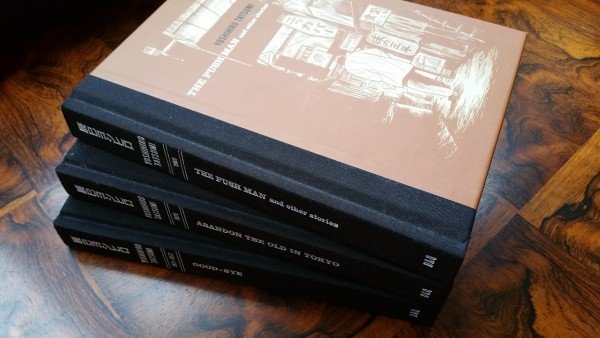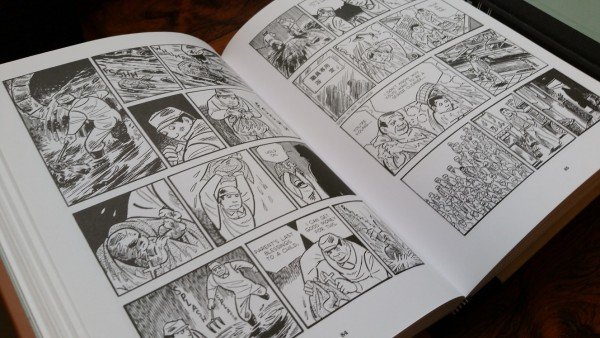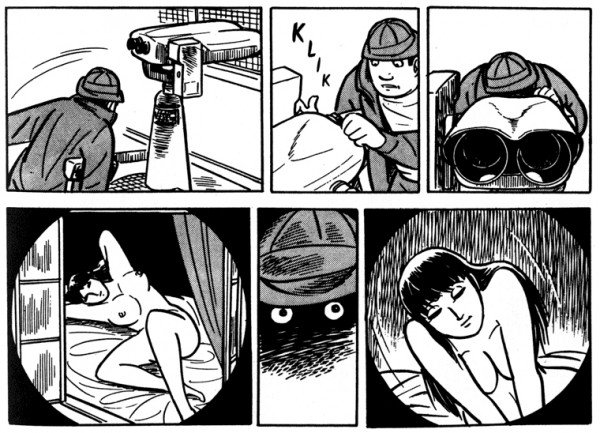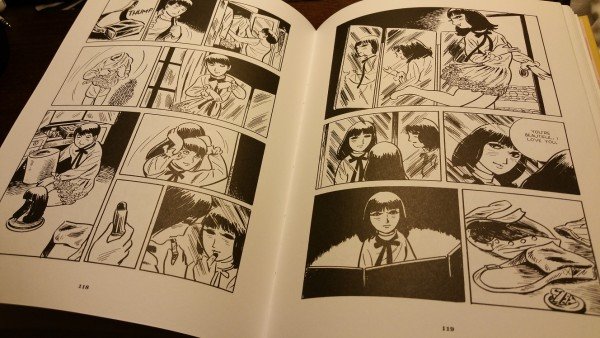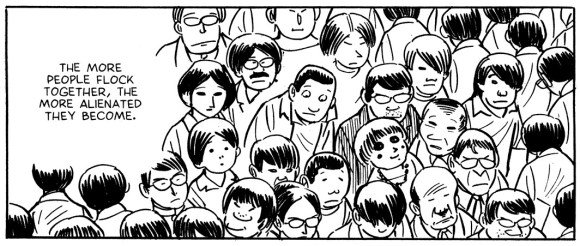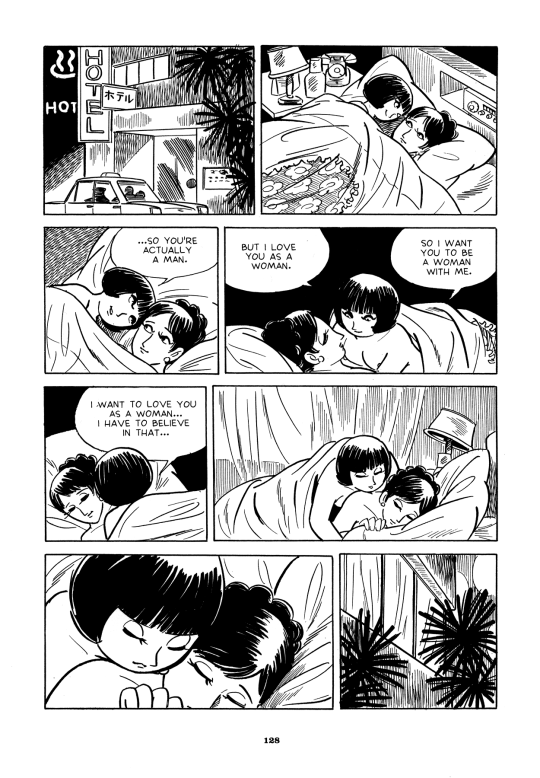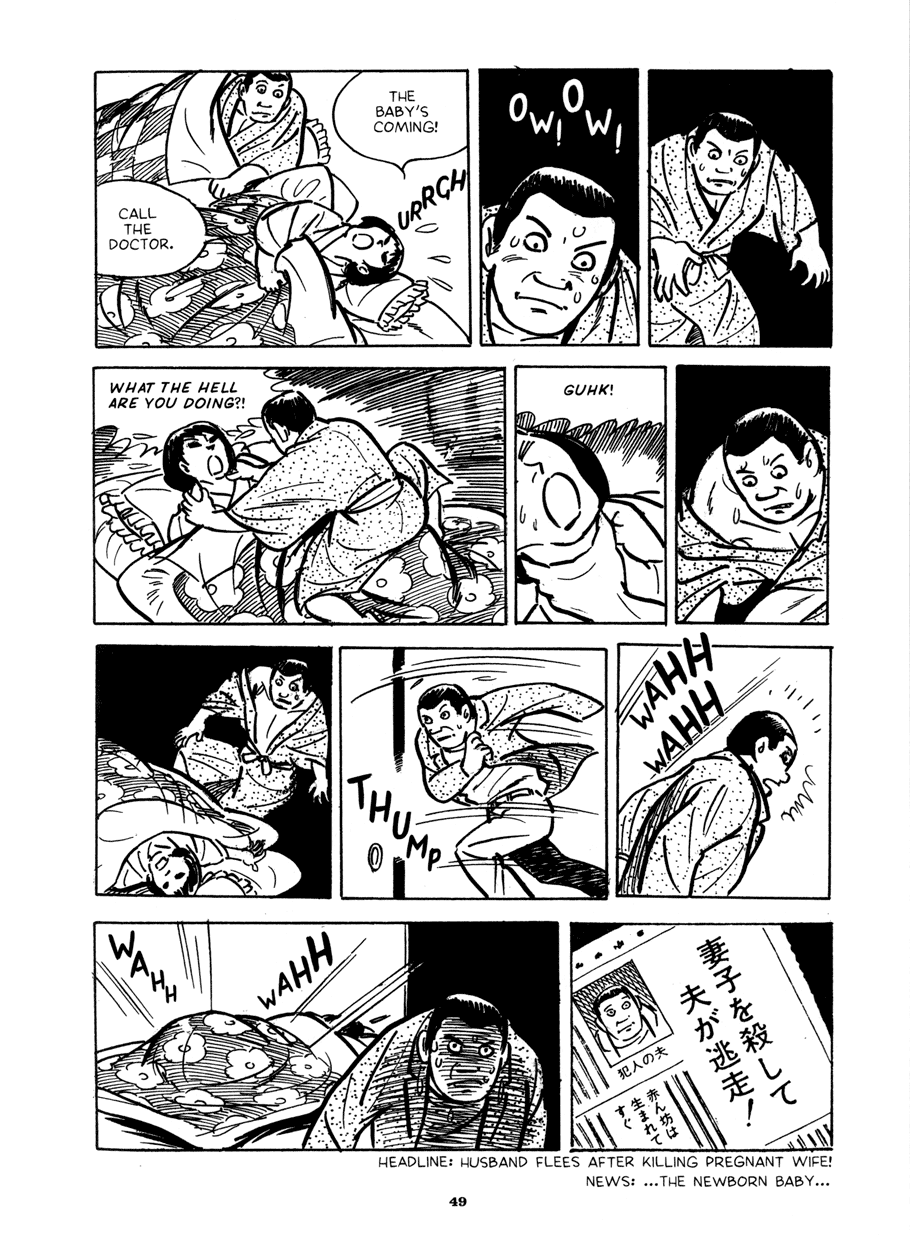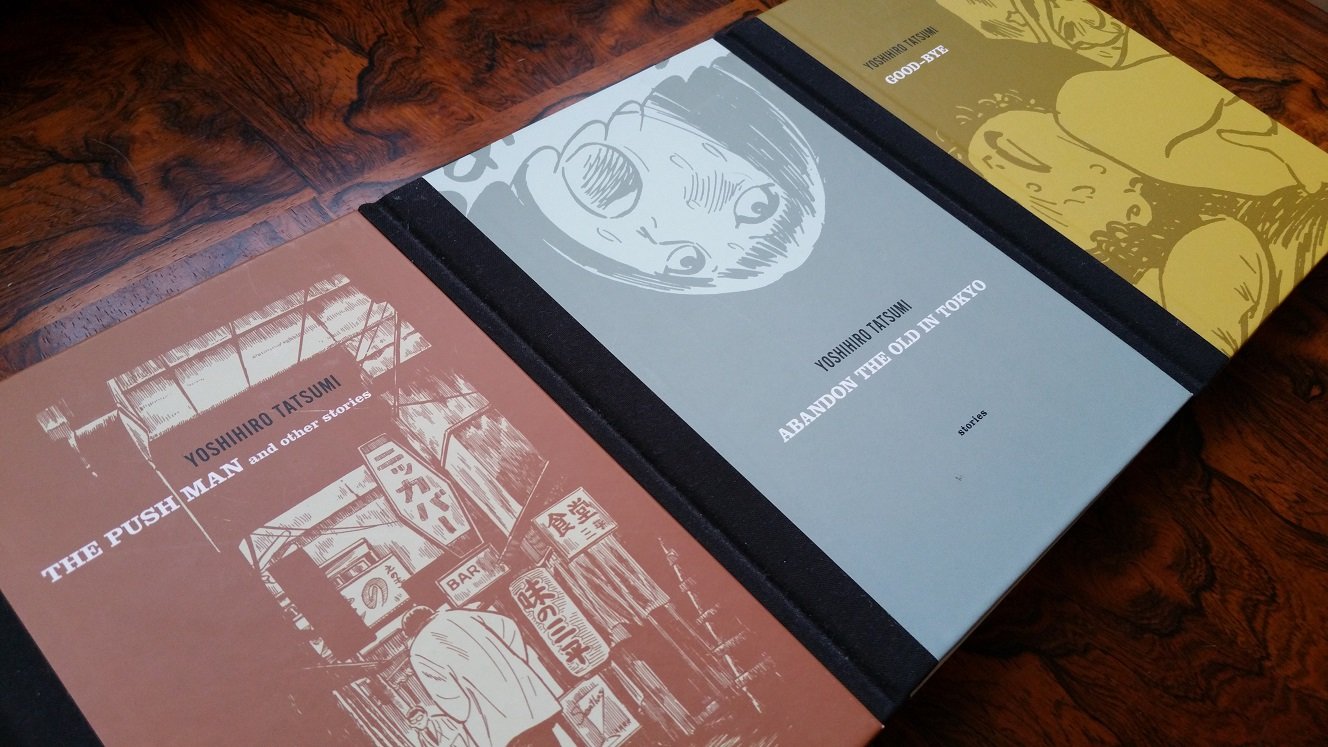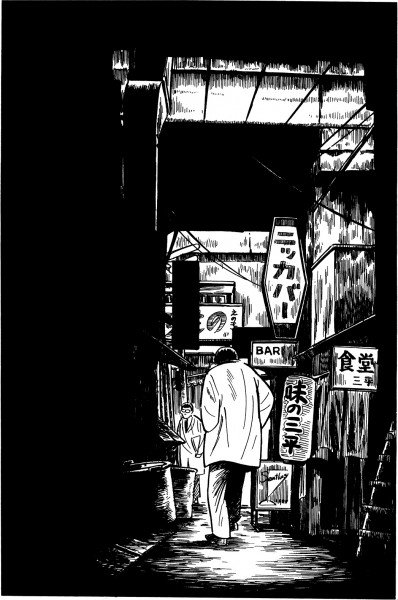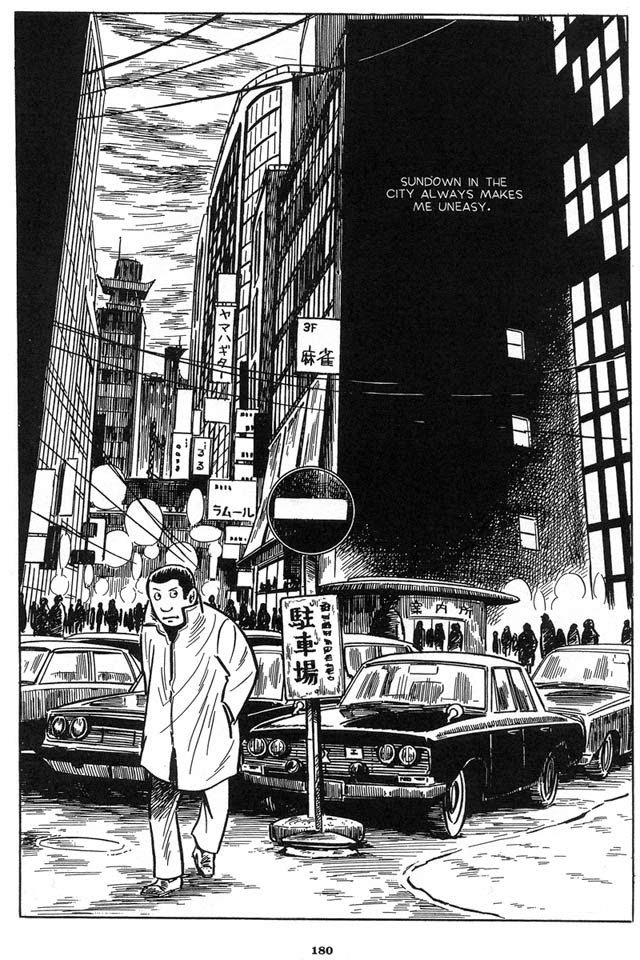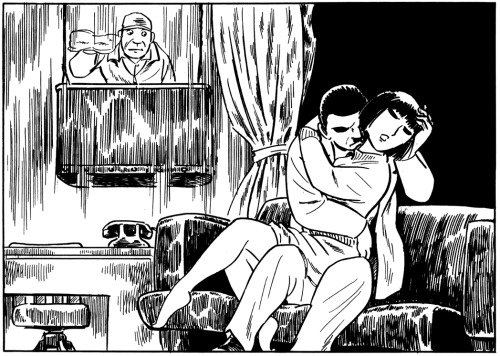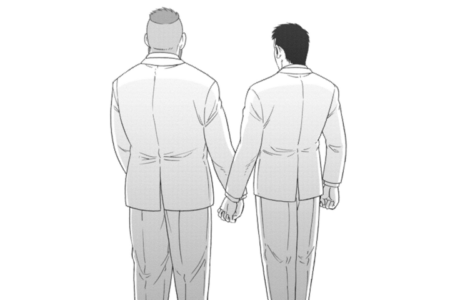It’s not Manga, it’s Gekiga – the short stories of Yoshihiro Tatsumi
My introduction to Gekiga and the short stories of Yoshihiro Tatsumi came purely by chance. While browsing the shelves at my local bookstore, I came across three black cloth spines, embossed with kanji and dated from the 1960’s to the 70’s. I didn’t judge these books by the covers, rather their bindings – which makes me a uniquely shallow individual.
I immediately fell in love the books. I hadn’t read them, but their hard back covers with their understated artwork and cloth bindings made them objects that I had to have. I quickly flicked though their pages and my fleeting first impressions was that I didn’t really like the artwork – not that it mattered, as I’d already decided to buy them. I have cherished them ever since – revisiting them perhaps once a year, as if to reconfirm their brilliance.
The books in questions are ‘The Push Man and other stories’, ‘Abandon the old in Tokyo’ and ‘Good-Bye’. Each a collection of short-stories. Each book giving unique insight into Japan of the 60’s and 70’s. Each book remarkable for their bluntness. They hold a candle up to the dark recesses of human behaviour, are at once calm and sympathetic – and yet utterly, utterly bleak and bereft of hope.
There’s a good reason for this – Yoshihiro Tatsumi’s work isn’t Manga. The word ‘Manga’ means ‘whimsical pictures’- and became hugely popular from the late 50’s onwards, in part, thanks to the work of Osamu Tezuka. Tatsumi wanted to differentiate himself from Manga and Tezuka’s work – and so coined the term ‘Gekiga’, or ‘Dramatic Pictures’.
Gekiga were far more experimental – often taking the form of short stories which most mainstream Manga publishers wouldn’t release, and releasing predominantly in lending libraries which tended to be more open-minded in the range of books and magazines they stocked.
I must confess that I’m no expert in Gekiga. In fact, the three collections of Yoshihiro Tatsumi’s work, published by Drawn and Quarterly are the only works of Gekiga that I’ve read – and so it’s specifically these that I’d like to introduce you to.
The first thing that strikes you as you begin to read Tatsumi’s work is the fact that, barring a few differences here and there, the central character in each story is effectively the same person. Similar in design, though not in name – he is intentionally an every-man. He’s indistinguishable from anyone else, unremarkable, there’s nothing special about him at all. Likewise, the supporting characters often all look familiar, there are no heroes here – this is every day humdrum existence, they’re your neighbours, your colleagues, the stranger in the street, or on the train.
But most importantly, they could be you.
For the few short minutes that it takes to read each story, Tatsumi is inviting you to put yourself in the shoes this ‘everyman’. It’s easily done too – while some of the activities undertaken in the book are morally dubious, often repugnant, Tatsumi’s skill is in presenting these issues in a way that’s very matter of fact and universally accessible.
This is how the world is. This is what life can be. This is how people are sometimes.
Tatsumi isn’t being objective as such (because there is an underlying current of sympathy within his work) but what’s remarkable is his restraint in never asking you to judge. He doesn’t invite scorn, or pity – he’s not casting his characters as ‘evil’. It’s not a case of ‘look at these people, recoil at the horrors of the world we live in.’ Instead Tatsumi is simply asking you to look – pass judgement if you want to, but that’s your call.
It’s an impressive feat. Perhaps the most interesting thing of all is that, despite the dark subject matter it’s hard to judge because in some small way, Tatsumi is holding up a mirror to our own lives. While we might not be adulterous, or hide sex slaves in our apartment, or feel compelled to masturbate in public places -there are ongoing themes in Tatsumi’s work which will, if not strike a cord, then certainly help you to understand.
At some point in our lives we will all be lonely, unfulfilled emotionally or sexually – or feel trapped in a relationship, or feel we deserve more, or need to run away from our responsibilities or feel jealous, or ashamed – these are all aspects of life which Yoshihiro Tatsumi touches on with astonishing frankness.
Tatsumi tackles such a huge range of issues and scenarios in his stories that it would be difficult to talk about them all, so I’ll draw on a few that might give you a feel for what to expect.
The double page spread above is undoubtedly one of my favourites. It’s simple and elegant, calm and humble – though the subject matter of gender identity particularly for the 1970’s is a challenging one. What I like the most about this story is that’s it’s actually being recalled by the friend of the main character above decades later in life – recalling, with the understanding that can age bring, what it was that made his friend different.
It’s a particularly forward-thinking piece and indicative of much of Tatsumi’s work. The very fact that Tatsumi never passes judgement means that each story is free of the morals and ethics of that particular time and place. They cast off the trappings of the generation in which they were written, becoming almost timeless as a result and, crucially, manage to transcend any cultural barriers.
Chief among these are the trials of living in a booming economy and, in particular, a bustling city. Anyone who’s lived in a city like Tokyo, or London, or New York, or Paris will understand how lonely it can feel. Surrounded by people, but never more isolated. Finding it difficult to connect – when all around you is a sea of diversity both professionally, morally, socially and sexually.
Within this social and economic quagmire, it’s easier to lose yourself, become disaffected and struggle to find your identity, your place in life – this is an important part of Tatsumi’s work. Fractured domestic relationships – both between loved ones and family are common place in his short stories.
One story touches on an elderly man who’s business has long since fallen into ruin – but still goes to the office every day because he knows nothing else. Another story sees a woman seek solace from her marriage to an elderly man with another woman, who turns out to be a man, cross-dressing as an escape from his own wife.
These stories are thrown together in much the same way as we’re thrown together with our neighbours and colleagues. Our truest selves, our real lives often hidden from each other either though choice or fear or stigma. In these stories, Yoshihiro Tatsumi lays them bare for us, brings them into the light of day – naked and free from shame.
There’s no taboo not worth touching on in these stories – but because they’re never glorified or vilified, reading each three-minute slice of life becomes immediately fascinating and compulsive.
It’s with some sadness then that, when I began to write this piece, I discovered that Yoshihiro Tatsumi passed away in March of this year.
Given that this fact had passed me by, when I’ve long been an admirer of his work, I think is indication enough that more people need to experience his stories.
And so I urge you to seek out these collections. Start with The Push Man and Other Stories’ first and see how you go. I genuinely believe that anyone who reads these shorts won’t fail to be profoundly affected by what they find – and it’s not often I get to write those words.
For those of you who want to take their reading further, Yoshihiro Tatsumi also wrote an extensive autobiography called ‘A Drifting Life‘ which I’m currently reading. You can discover all of Tatsumi’s translated works here.
- Wonderful new Konosuba game gets release date and pre-order - January 11, 2024
- Kandagawa Jet Girls gameplay featuring Senran Kagura DLC - January 16, 2020
- Japanese politicians look to limit videogame play time for kids - January 13, 2020



